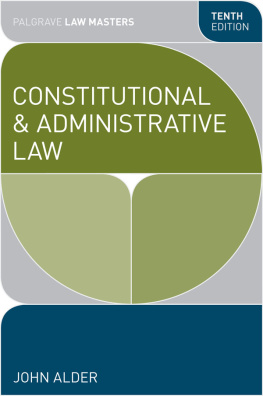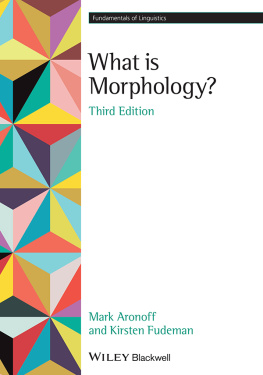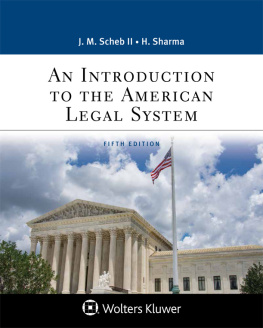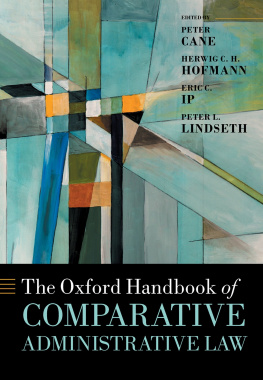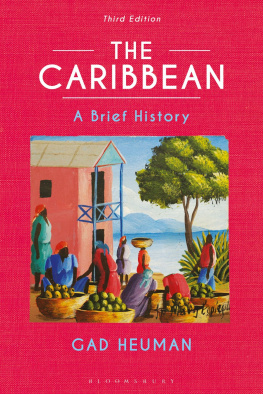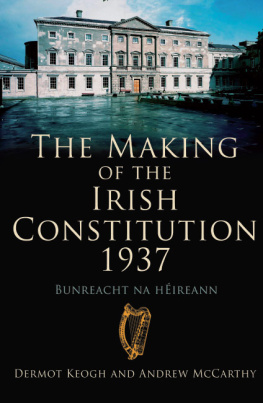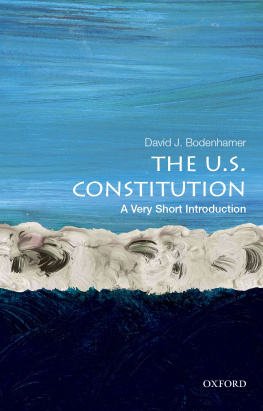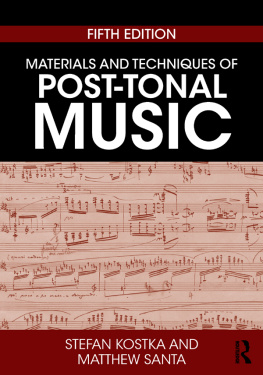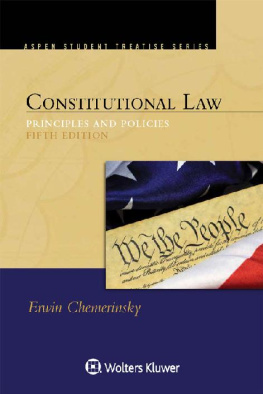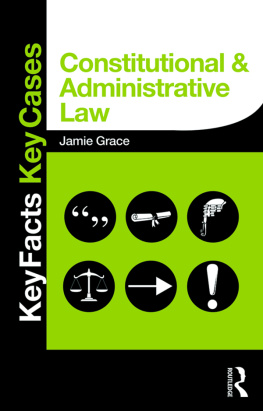palgrave law masters
constitutional and administrative law
palgrave law masters
Company Law Janet Dine and Marios Koutsias
Constitutional and Administrative Law John Alder
Contract Law Ewan McKendrick
Criminal Law Jonathan Herring
Employment Law Deborah J Lockton
Evidence Raymond Emson
Family Law Kate Standley and Paula Davies
Intellectual Property Law Tina Hart, Simon Clark and Linda Fazzani
Land Law Mark Davys
Landlord and Tenant Law Margaret Wilkie, Peter Luxton, Jill Morgan and Godfrey Cole
Legal Method Ian McLeod
Legal Theory Ian McLeod
Medical Law Jo Samanta and Ash Samanta
Sports Law Mark James
Torts Alastair Mullis and Ken Oliphant
Trusts Law Charlie Webb and Tim Akkouh
If you would like to comment on this book, or on the series generally, please write to lawfeedback@palgrave.com.
palgrave law masters
constitutional and administrative law
john alder
Emeritus Professor of Law, Newcastle University
Visiting Professor of Law, Bangor University
Tenth edition

John Alder 1989, 1994, 1999, 2002, 2005, 2007, 2009, 2011, 2013 and 2015
All rights reserved. No reproduction, copy or transmission of this publication may be made without written permission.
Crown Copyright material is licensed under the Open Government Licence v2.0.
No portion of this publication may be reproduced, copied or transmitted save with written permission or in accordance with the provisions of the Copyright, Designs and Patents Act 1988, or under the terms of any licence permitting limited copying issued by the Copyright Licensing Agency, Saffron House, 610 Kirby Street, London EC1N 8TS.
Any person who does any unauthorized act in relation to this publication may be liable to criminal prosecution and civil claims for damages.
The author has asserted his right to be identified as the author of this work in accordance with the Copyright, Designs and Patents Act 1988.
This edition first published 2015 by
PALGRAVE
Palgrave in the UK is an imprint of Macmillan Publishers Limited, registered in England, company number 785998, of 4 Crinan Street, London N1 9XW.
Palgrave Macmillan in the US is a division of St Martins Press LLC, 175 Fifth Avenue, New York, NY 10010.
Palgrave is a global imprint of the above companies and is represented throughout the world.
Palgrave and Macmillan are registered trademarks in the United States, the United Kingdom, Europe and other countries.
ISBN 9781137474919
This book is printed on paper suitable for recycling and made from fully managed and sustained forest sources. Logging, pulping and manufacturing processes are expected to conform to the environmental regulations of the country of origin.
A catalogue record for this book is available from the British Library.
A catalog record for this book is available from the Library of Congress.
Typeset by MPS Limited, Chennai, India.
Preface
As in previous editions, the aims of the book are firstly to explain the main principles of United Kingdom constitutional law in the context of the political and legal values that influence their development and secondly to draw attention to the main controversies. The book is intended as a self-contained text for those new to the subject and a starting point for more advanced students.
The main legislative developments since the previous edition weaken the rule of law in favour of the executive. They include the Crime and Courts Act 2013 and the Criminal Justice and Courts Act 2014 which weaken judicial review of governmental action. The Immigration Act 2014 restricts appeals and access to public services by immigrants, and the Justice and Security Act 2013 introduces secrecy in civil cases. The Data Retention and Investigatory Powers Act 2014, which was rushed through Parliament in two days without detailed discussion, reinforces government power to obtain personal information.
On the other hand the Crime and Courts Act 2013 strengthens the separation of powers by transferring the Lord Chancellors role in junior judicial appointments to the Lord Chief Justice and enhances freedom of expression by abolishing the old offence of scandalizing the judiciary. The Defamation Act 2013 restricts jury trial but on the whole reinforces the right to freedom of speech.
The Transparency of Lobbying, Non-Party Campaigning and Trade Union Administration Act 2014 makes some inroads upon the culture of petty corruption in public affairs by making professional lobbying of government more transparent, but places new restrictions on volunteer political campaigners during elections. In relation to the more archaic aspects of the constitution, the Succession to the Crown Act 2013 removes some discriminatory disqualifications from the monarchy, and the House of Lords Reform Act 2014 makes much needed albeit peripheral reforms which may help the House of Lords to salvage its tawdry reputation by exercising greater control over the conduct of its members.
The cases continue to raise important constitutional issues notably in respect of democracy, parliamentary supremacy, parliamentary privilege, devolution, voting rights, open justice and freedom of information. In relation to judicial review and human rights there are new cases on fairness, fettering discretion, deprivation of liberty, freedom of religion, freedom of expression, the authority of Strasbourg cases and the Declaration of Incompatibility.
The Political and Constitutional Reform Select Committee of the House of Commons has published its report on the case for a written constitution: A New Magna Carta? (July 2014). This provides a useful summary of constitutional principles. There is also a report from the Joint Committee on Parliamentary Privilege providing an overview of the topic but without recommending major changes.
, all of which are substantially revised, concern the underlying legal principles of the rule of law, the separation of powers and parliamentary sovereignty. In particular there is increased material on judicial accountability and independence.
(substantially revised) discusses the most important international influence, namely the EU, which is firmly anchored into domestic law.
, Devolution, includes the possible constitutional unravelling in the wake of the referendum on Scottish independence in September 2014.
there is a new section, Open Justice, in connection with freedom of the press and government secrecy: The Counter Terrorism and Security Bill (20145) is included as it stood when it left the Commons in January 2015.
As regards further reading, references to books and articles in the text are to writings that expand on the point in question. The Further Reading at the end of each chapter discusses fundamental and controversial general issues for those who require greater depth or more ideas and points of view. Readings considered particularly accessible to students are marked *. Short references in the text are to the Further Reading.
Unless otherwise stated, the main classical works cited throughout are as follows:
Bagehot, The English Constitution, ed. Crossman (8th edn, Fontana/Collins 1963)
Dicey, An Introduction to the Study of the Law of the Constitution (8th edn, Macmillan 1915, referenced as last edition for which Dicey was himself responsible); (10th edn, Macmillan 1958, ed. ECS Wade)
Hobbes, Leviathan, ed. Minogue (Dent 1973)
Locke, Two Treatises of Government
Next page
